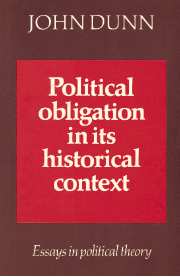10 - Political obligations and political possibilities
Published online by Cambridge University Press: 22 August 2009
Summary
Things goeing soe easy soe smooth and soe right in your house, I know you will excuse me that I went into the country to enjoy there an uninterrupted satisfaction and quiet in the contemplation of them. I hope they continue in the same course since my comeing away, and the zeale and forwardnesse of you your selves makes it needlesse for us without dores soe much as to thinke of the publique which is the happyest state a country can be in, when those whose businesse it is, take such care of affairs that all others quietly and with resignation acquisce and thinke it superfluous and impertinent to medle or beat their heads about them.
John Locke to Edward Clarke (a Member of the House of Commons), 17 October 1690 (E.S. de Beer (ed.), The Correspondence of John Locke, Vol. IV, Oxford 1979, p. 148)Do all human beings (or any human beings) have rational political obligations? Are political commitments, commitments either to sustain holders of political authority or to further socially extended shared human purposes, a necessary component of any rationally conceived human life? Or is it more appropriate to think of the moral acceptance of existing political institutions or the disposition to attempt to create what are presumed to be superior political institutions simply as an ideological condition, a state of belief and sentiment which we might (for example) be sure to have been causally generated but in relation to which no question of truth or falsehood, intrinsic validity or contingent error can coherently arise? These alternatives are certainly not exhaustive; but we may conveniently take them as a crude initial index of the range of disagreement about this issue which obtains at present.
- Type
- Chapter
- Information
- Political Obligation in its Historical ContextEssays in Political Theory, pp. 243 - 300Publisher: Cambridge University PressPrint publication year: 1980
- 1
- Cited by



